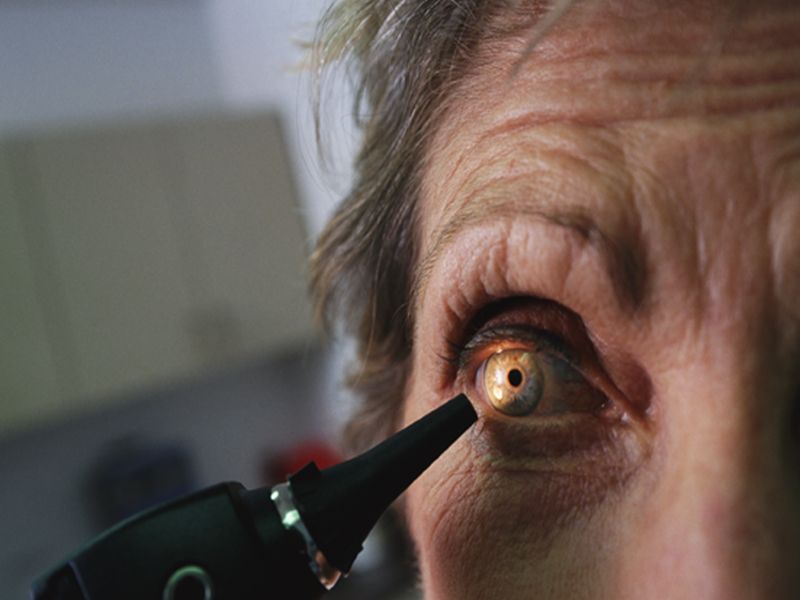Experimental Drug Reveals Promise for Sight-Stealing Eye Situation
 By Steven Reinberg
By Steven ReinbergHealthDay Reporter
WEDNESDAY, Jan. 18, 2017 (HealthDay Information) -- An experimental drug might sooner or later make remedy easier for sufferers affected by vision-threatening age-related macular degeneration, researchers say.
To this point, the drug -- known as AXT107 -- has been solely examined on mice and rabbits, however it requires far fewer injections than present remedy to stop imaginative and prescient loss. Present remedy requires frequent injections straight into the attention.
"We anticipate injection of AXT107 in people might have a considerably longer impact than present remedy," stated lead researcher Dr. Peter Campochiaro. He is a professor of ophthalmology at Johns Hopkins College in Baltimore.
"As a substitute of eye injections each 4 to 6 weeks, we hope it will be a number of months between injections," he stated.
The drug take a look at in rabbits lasted solely two months, however the drug appeared each secure and efficient, Campochiaro stated.
Researchers hope to begin the primary human trials later this yr. This part 1 trial would take a look at the security of the drug in individuals, however additional exams could be required to see how efficient it's, Campochiaro stated.
Analysis with animals doesn't at all times produce comparable ends in individuals.
Age-related macular degeneration is a typical eye situation and a number one explanation for imaginative and prescient loss amongst individuals age 60 and older, in keeping with the U.S. Nationwide Institutes of Well being.
The situation causes harm to the macula, a small spot close to the middle of the retina and the a part of the attention wanted for sharp imaginative and prescient.
In some individuals, age-related macular degeneration advances so slowly that imaginative and prescient loss would not happen for a very long time. In others, the illness progresses sooner and will result in a lack of imaginative and prescient in a single or each eyes, in keeping with the NIH.
As age-related macular degeneration progresses, a blurred space close to the middle of imaginative and prescient is a typical symptom. Over time, the blurred space might develop bigger and clean spots might develop in central imaginative and prescient. Objects additionally might not seem as vibrant as they used to.
Age-related macular degeneration by itself would not result in full blindness, the NIH says. The lack of central imaginative and prescient can, nonetheless, intrude with easy actions, akin to the flexibility to see faces, drive, cook dinner, learn and write.
One sort of this situation is called "moist" or neovascular age-related macular degeneration. This sort develops when new blood vessels kind and leak fluid and blood into the attention, inflicting swelling and harm, in keeping with the NIH.
Therapies for this kind of macular degeneration have restricted effectiveness and require month-to-month injections straight into the attention to stop irreversible imaginative and prescient loss, Campochiaro defined.
However the injections of AXT107 in animals lasted twice so long as the same old medication, akin to aflibercept (Eylea). Aflibercept prevents blood vessel progress by blocking a protein known as vascular endothelial progress issue (VEGF).
AXT107 additionally targets VEGF and three different elements that promote blood vessel progress, Campochiaro stated.
Furthermore, AXT107 types a gel throughout the eye, which permits it to be launched over a number of months, decreasing the variety of eye injections sufferers want to manage the illness, he stated.
"AXT107 might present a solution to get pretty much as good or higher results as sufferers are getting with present remedy, however with fewer visits and injections," Campochiaro stated.
The report was printed Jan. 18 within the journal Science Translational Drugs.
One eye specialist not concerned with the examine stated the frequency of present remedies is usually a downside.
"Sufferers with age-related macular degeneration are flooding our places of work with a number of injections," stated Dr. Mark Fromer, an ophthalmologist at Lenox Hill Hospital in New York Metropolis.
"We'd like remedies that last more, as a result of you have got 60- to 80-year-old sufferers, it is virtually inconceivable for them to return to the workplace each month. They do it, however it's tough," Fromer stated.
The much less a affected person has to return to the physician's workplace, the higher the compliance, he stated.
"If they'll are available 5 or 6 occasions a yr, it's significantly better for affected person compliance and might also end in higher care," Fromer stated. "Something we will do to cut back affected person visits is a plus."

Copyright © 2017 HealthDay. All rights reserved.
SOURCES: Peter Campochiaro, M.D., professor, ophthalmology, Johns Hopkins College, Baltimore; Mark Fromer, M.D., ophthalmologist, Lenox Hill Hospital, New York Metropolis; Jan. 18, 2017, Science Translational Drugs
No comments:
Post a Comment